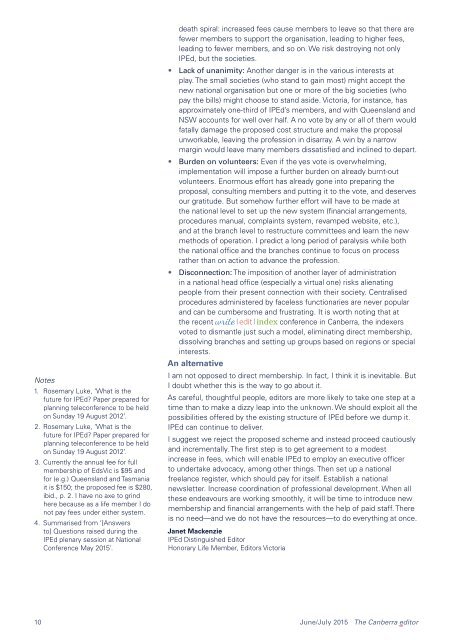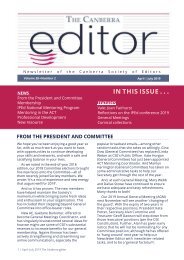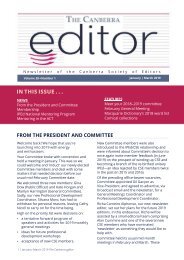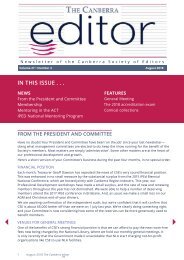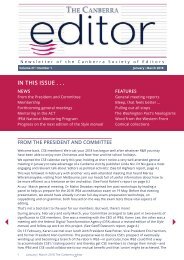The Canberra editor June-July 2015
Newsletter of the Canberra Society of Editors
Newsletter of the Canberra Society of Editors
You also want an ePaper? Increase the reach of your titles
YUMPU automatically turns print PDFs into web optimized ePapers that Google loves.
Notes<br />
1. Rosemary Luke, ‘What is the<br />
future for IPEd? Paper prepared for<br />
planning teleconference to be held<br />
on Sunday 19 August 2012’.<br />
2. Rosemary Luke, ‘What is the<br />
future for IPEd? Paper prepared for<br />
planning teleconference to be held<br />
on Sunday 19 August 2012’.<br />
3. Currently the annual fee for full<br />
membership of EdsVic is $95 and<br />
for (e.g.) Queensland and Tasmania<br />
it is $150; the proposed fee is $280,<br />
ibid., p. 2. I have no axe to grind<br />
here because as a life member I do<br />
not pay fees under either system.<br />
4. Summarised from ‘[Answers<br />
to] Questions raised during the<br />
IPEd plenary session at National<br />
Conference May <strong>2015</strong>’.<br />
death spiral: increased fees cause members to leave so that there are<br />
fewer members to support the organisation, leading to higher fees,<br />
leading to fewer members, and so on. We risk destroying not only<br />
IPEd, but the societies.<br />
• Lack of unanimity: Another danger is in the various interests at<br />
play. <strong>The</strong> small societies (who stand to gain most) might accept the<br />
new national organisation but one or more of the big societies (who<br />
pay the bills) might choose to stand aside. Victoria, for instance, has<br />
approximately one-third of IPEd’s members, and with Queensland and<br />
NSW accounts for well over half. A no vote by any or all of them would<br />
fatally damage the proposed cost structure and make the proposal<br />
unworkable, leaving the profession in disarray. A win by a narrow<br />
margin would leave many members dissatisfied and inclined to depart.<br />
• Burden on volunteers: Even if the yes vote is overwhelming,<br />
implementation will impose a further burden on already burnt-out<br />
volunteers. Enormous effort has already gone into preparing the<br />
proposal, consulting members and putting it to the vote, and deserves<br />
our gratitude. But somehow further effort will have to be made at<br />
the national level to set up the new system (financial arrangements,<br />
procedures manual, complaints system, revamped website, etc.),<br />
and at the branch level to restructure committees and learn the new<br />
methods of operation. I predict a long period of paralysis while both<br />
the national office and the branches continue to focus on process<br />
rather than on action to advance the profession.<br />
• Disconnection: <strong>The</strong> imposition of another layer of administration<br />
in a national head office (especially a virtual one) risks alienating<br />
people from their present connection with their society. Centralised<br />
procedures administered by faceless functionaries are never popular<br />
and can be cumbersome and frustrating. It is worth noting that at<br />
the recent write|edit|index conference in <strong>Canberra</strong>, the indexers<br />
voted to dismantle just such a model, eliminating direct membership,<br />
dissolving branches and setting up groups based on regions or special<br />
interests.<br />
An alternative<br />
I am not opposed to direct membership. In fact, I think it is inevitable. But<br />
I doubt whether this is the way to go about it.<br />
As careful, thoughtful people, <strong>editor</strong>s are more likely to take one step at a<br />
time than to make a dizzy leap into the unknown. We should exploit all the<br />
possibilities offered by the existing structure of IPEd before we dump it.<br />
IPEd can continue to deliver.<br />
I suggest we reject the proposed scheme and instead proceed cautiously<br />
and incrementally. <strong>The</strong> first step is to get agreement to a modest<br />
increase in fees, which will enable IPEd to employ an executive officer<br />
to undertake advocacy, among other things. <strong>The</strong>n set up a national<br />
freelance register, which should pay for itself. Establish a national<br />
newsletter. Increase coordination of professional development. When all<br />
these endeavours are working smoothly, it will be time to introduce new<br />
membership and financial arrangements with the help of paid staff. <strong>The</strong>re<br />
is no need—and we do not have the resources—to do everything at once.<br />
Janet Mackenzie<br />
IPEd Distinguished Editor<br />
Honorary Life Member, Editors Victoria<br />
10 <strong>June</strong>/<strong>July</strong> <strong>2015</strong> <strong>The</strong> <strong>Canberra</strong> <strong>editor</strong>


